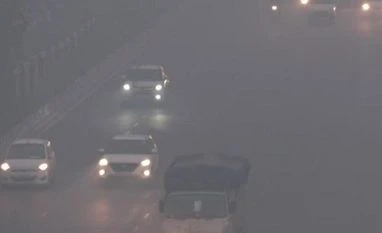A thick layer of smog engulfed the national capital after people burst crackers on Diwali night, leading to heavy pollution all across the city, which is already battling with its deteriorating air quality.
Visuals from various parts of Delhi showed thick haze covering the roads, significantly reducing visibility and making it difficult to see beyond a few hundred metres.
What is important to note is that the national capital has already been struggling with pollution for the last few weeks. The AQI at many places peaked in the'severe' category and continued to remain toxic for several days, but after Diwali, it is now very likely that the national capital will once again witness a rise in pollution levels, making it difficult for the people inside the city to breathe.
Recently, Arvind Kejriwal-led AAP government in Delhi imposed a complete ban on firecrackers. In wake of the pollution situation, the government even considered the idea of 'artificial rain' to tackle the foul air in the city, until sudden rainfall brought a major respite, lowering the pollution level.
The latest posts shared on social media sites and reports have shown that a large number of people at different places have taken part in the burning of firecrackers. Sunday night's visuals from Lodhi Road, RK Puram, Karol Bagh, and Punjabi Bagh showed intense fireworks lighting up the night sky across several areas in the national capital.
Previous data related to pollution shows that since the last week of October, the national capital's air quality has been at its worst. The concentration of PM 2.5 in the city has been recorded at 20 times the limit prescribed by the World Health Organisation, prompting the city government to order the closure of all primary classes and restrict the entry of trucks.
Despite the Delhi government's 'Diya Jalao, Patakhe nahi' campaign and the Supreme Court's order on firecrackers, rising pollution is likely to dim the light in the city after festivity ends.
)